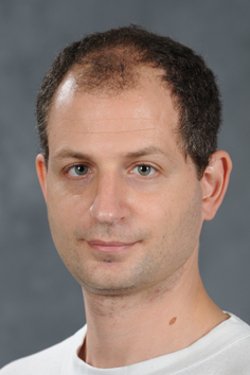Erez Berg
2019 Israel Award Winner — Faculty

Current Position:
Associate Professor, Department of Condensed Matter Physics
Institution:
Weizmann Institute of Science
Discipline:
Condensed Matter Physics

Current Position:
Associate Professor, Department of Condensed Matter Physics
Institution:
Weizmann Institute of Science
Discipline:
Condensed Matter Physics
Recognized for: Developing novel theoretical and computational tools to study long-standing and emerging questions in quantum materials
Areas of Research Interest and Expertise: Quantum Materials, Metallic Quantum Criticality, Quantum Monte-Carlo Method, Superconductor, Topological Phases of Matter
Biography:
BA, Technion – Israel Institute of Technology
MSc, Technion – Israel Institute of Technology (Advisor: Prof. Assa Auerbach)
PhD, Stanford University, USA (Advisor: Prof. Steven Kivelson)
Postdoctoral Scholar, Harvard University, USA (Advisors: Prof. Eugene Demler and Prof. Subir Sachdev)
Senior Lecturer, Weizmann Institute of Science
Associate Professor, Weizmann Institute of Science, and concurrently (2017-2018), Associate Professor, University of Chicago, USA
Dr. Erez Berg has conducted creative and influential theoretical studies to gain valuable insights into quantum materials – materials bearing macroscopic quantum physics phenomena that cannot be completely understood with concepts from contemporary physics textbooks. His research topics are wide-ranging, from the decades-old debate about the theory underlying the functioning of high-temperature superconductors, to increasing our understanding of novel topological phases of matter, a research field that has emerged in the past decade that identifies unique electronic properties of materials arising from the special geometries (or “topologies”) in which the electrons arrange themselves. These exotic phenomena, which could enable new and important techniques to next generation electronics, have not yet been used in real world applications due to the poor understanding of the physics principles behind them.
During his earlier work, Dr. Berg undertook a landmark computational method to study an important phenomenon, called metallic quantum criticality, which is commonly seen in many quantum materials. Dr. Berg overcame the obstacle that hindered previous theoretical studies and presented a controllable physics description of this phenomenon, an important first step toward a complete understanding of its mechanism, which has key implications in the theory of high-temperature superconductors. Recently Dr. Berg’s work has pushed the conceptual frontiers of topological quantum materials in two new directions. He spearheaded a novel method that for the first time realized topological phenomena in an otherwise non-topological quantum system by applying an external driving force, which led to immediate experimental implementations in real materials. He also led the theoretical search for new physical platforms for topological superconductors, which are very promising for storing and manipulating quantum information. These achievements, along with a number of other research fronts, testify to his significant impact on a wide breadth of important central questions in the field.
“The great thing about working on quantum materials is not just that you study fascinating phenomena, but also that you get to talk to so many enthusiastic, bright people who share your interests.”
Key Publications:
F. Pientka, A. Keselman, E. Berg, A. Yacoby, A. Stern, B. I. Halperin. Topological Superconductivity in a Planar Josephson Junction. Phys. Rev. X, 2017.
Y. Werman, S. A. Kivelson, E. Berg. Non-quasiparticle Transport and Resistivity Saturation: a View from the Large-N Limit. npj Quantum Mater., 2017.
Y. Schattner, M. H. Gerlach, S. Trebst, E. Berg. Competing Orders in a Nearly Antiferromagnetic Metal. Phys. Rev. Lett., 2016.
P. Titum, E. Berg, M. S. Rudner, G. Refael, N. H. Lindner. Anomalous Floquet-Anderson Insulator as a Nonadiabatic Quantized Charge Pump. Phys. Rev. X, 2016.
Other Honors:
| 2015 | Morris L. Levinson Prize in Physics, Weizmann Institute of Science |
| 2013 | Minerva Arches Prize, Minerva Foundation |
| 2012 | Alon Fellowship, Council of Higher Education, Israel |
In the Media:
Hayadan (Israeli Science and Technology News) - A sign of a high temperature superconductor (in Hebrew)